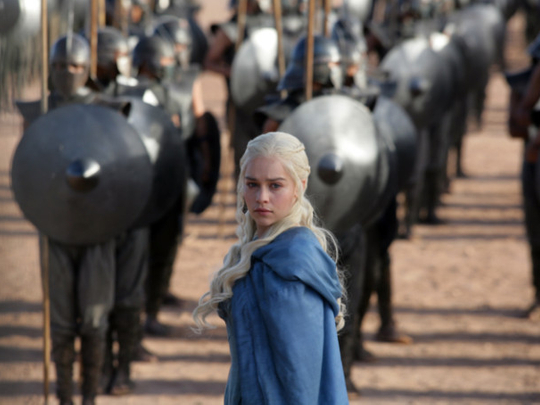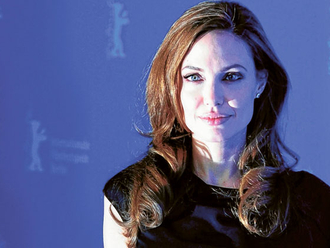
To do real justice to "Game of Thrones," I'd have to quit my job and tackle those 4,000 or so unread pages of George R.R. Martin's series of five fantasy novels on which the finely crafted HBO series is based.
There just isn't that sort of time in my sort of world. "Game of Thrones," which begins its third season Sunday night, is like no other TV show around right now - brilliant, exasperating, enthralling, and, if you let it become so, hard work. It's rare that I want take-backs as a critic, but it still pains me to encounter my first "Game of Thrones" review in the archives, in which I was too dismissive of the show when it began in 2011.
I was right about a couple of things - "Game of Thrones" is and always will be a tad supercilious - and wrong about what I perceived to be its barrier to entry, which only revealed my bias against the tropes of fantasy (swords, dragons, castles, women as subservient wenches, etc.)
Yet for all its daunting and deliberate complexity, "Game of Thrones" succeeds because it accommodates both the casual viewer and the rabid fanatic, which is a nearly impossible trick in an age in which we ingest television and other media in the manner of a chicken who has outsmarted the Skinner box.
Even more difficult is to make a big-budget nerd-out such as "Game of Thrones" resonate so completely with more fickle audiences, who are constantly calculating their time investment (and the amount of their cable bills) against measurable satisfaction.
The show, created by David Benioff and D.B. Weiss, makes room for the people who've read Martin's books and the people who never will. It offers the AP-class challenge of myriad plots and characters without the insult of expositional dialogue or explanatory recap for those who lag behind. You can inform yourself deeply about its every twist and nuance (the Wikipedia entries alone run into the thousands of words) or - a really big OR - you can just hop on for the ride.
In this regard, "Game of Thrones" is a masterpiece in the making, now entering the hallowed territory of "The Wire." It demands your attention, but it also rewards any effort you give it, no matter how small. Part of the pleasure is in letting it wash over you, admiring its craftwork. "Game of Thrones" revels in the epic breadth of its source material, but never forgets that some of us slobs are simply watching television - and I don't use the word "simply" as a meaningless adverb here.
There is perhaps no more simple watcher of "Game of Thrones" than yours truly. I never ask "Who's that again?" during an episode anymore. I don't reach for my phone to look it up. I just bask in what's happening and let it take hold. I feel strongly about representing this particular viewer demographic whenever the show comes up in conversation, insisting that one can be ill-prepared for "Game of Thrones" and still partake in it, just like you needn't know what's going on with every work in a museum to appreciate it.
Having seen the first four episodes of this new season, I couldn't stop thinking about the highest compliment paid by the basement-dwelling Wayne and Garth in "Saturday Night Live" episodes of yore: We're not worthy! After all, can "Game of Thrones" truly belong to those of us who would probably not earn a passing grade on a multiple-choice exam about its central plots and characters? I am always just a bit wrong about their names and how to spell them and, like many, I get my royal houses of Westeros easily confused. Is it Cersey? Cersei? Hershey? Scratch that and just write "evil queen regent, mother of Joffrey" (Jeoffrie? Geoffrey?).
However they spell their names, they're still at the cold center of "Game of Thrones," where the Lannister house rules King's Landing with an uneasy grip. Peter Dinklage continues his standout performance as the vertically challenged Tyrion Lannister, who saved King's Landing from invasion at the end of last season but received only scorn from his vainglorious father, Tywin (Charles Dance).
When Tyrion asks Tywin for more power, his father scoffs: "I gave you real power and authority, and you chose to spend your days as you always have - bedding harlots and drinking with thieves." "Occasionally I drank with the harlots," Tyrion drolly replies. "Game of Thrones" involves, by my count, seven or eight separate warring factions spread across the make-believe, medieval continent of Westeros, depending on whether or not you count the brotherhood of the Night's Watch and the zombielike White Walkers; add to that another army amassing across a sea, led by Daenerys Targaryen (played by Emilia Clarke) who possesses three adolescent dragons and an unbending drive to reclaim the throne for her people. Which I hope she does.
"Game of Thrones" has mastered the modern art of the free-floating moral compass. You find yourself rooting for characters you disliked in seasons 1 or 2 - Daenerys being my current example - while remaining loyal to its purest heroes, such as stout-hearted Jon Snow (Kit Harington), stranded in the snowy north with the Wildings; or plucky Arya Stark (Maisie Williams), who has fallen in with a group of freelance warriors known as the Brotherhood Without Banners.
Elsewhere this season, there is a royal wedding in the works at King's Landing; Jaime Lannister (Nikolaj Coster-Waldau) and the big-lady knight (Brienne of Tarth, yes, that's the one - played by Gwendoline Christie) are still making their way across Westeros; the men of the Night's Watch are lost in zombieland. And yes, I know that to call the White Walkers zombies denigrates "Game of Thrones" and lumps it in with the far less sophisticated, though still enjoyable, AMC show "The Walking Dead." But again, I implore you: Let some of us watch "Game of Thrones" our own way, with whatever pop references and misnomers we require to get there.
For a viewer like me, the show's most generous moment might still be its opening theme: Against a thunderous drumbeat and mournful Ren-faire cello, we see a 3-D map of Westeros, its cities and regions rising and expanding like a cross between the Risk board and an animated set of Tinker Toys. The map - which has been revised for the current season - is incredibly helpful as an orientation tool and a thoughtful gesture for the perpetually lost.
That "Game of Thrones" has achieved zeitgeist status should offer a shred of hope for anyone who prematurely mourned the American attention span. It turns out we can pay meticulous attention when we want to. Imagine if the power exerted in analyzing and comprehending "Game of Thrones" could be exerted on the debt crisis?
This era was made for such a story. "Game of Thrones" is a reward for people who know too much. It's one of the few places on TV where they can use their advanced multi-tasking and light-speed comprehension skills; where, at last, one can sink deeply and satisfying into the couch and feel like that college degree is doing more than accruing interest.











